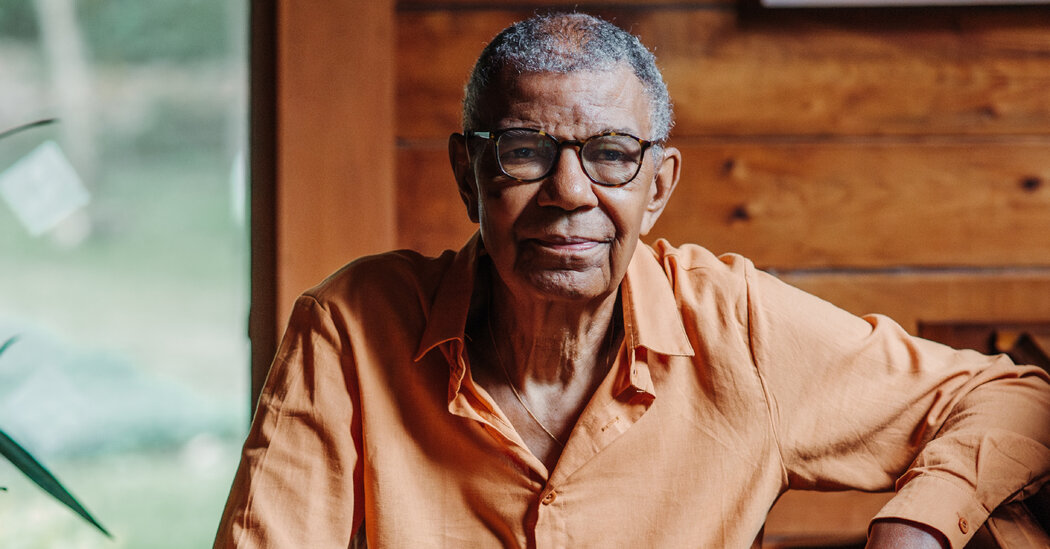Jack DeJohnette, a drummer whose command and versatility made him one of the standout jazz instrumentalists of the past five decades and an indispensable figure in era-defining bands like Charles Lloyd’s mid-1960s quartet, Miles Davis’s electrified group of the late 1960s and early ’70s, and Keith Jarrett’s long-running acoustic trio, died on Sunday in Kingston, N.Y. He was 83.
A family representative, Joan Clancy, said the cause of death, in a hospital, was congestive heart failure.
Mr. DeJohnette rose to prominence in the second half of the 1960s, when jazz was expanding in multiple directions, absorbing textures from rock, R&B and various international traditions, and embracing fearless abstraction. His approach, which could be hushed or explosive, swinging or fiercely funky, built bridges between the old and the new.
“I’m like a colorist on the drums,” he said in a 2015 video interview,” going on to liken himself to a “painter.” “So I can work within time, but I can also be free of it, more elastic in that sense.”
Having started out as a pianist, Mr. DeJohnette also grew into an accomplished bandleader and composer, heading a series of fresh and innovative groups starting in the 1970s, including New Directions and Special Edition.
He first drew attention in 1966 as part of a quartet led by the saxophonist and flutist Charles Lloyd. Completed by Mr. Jarrett and the bassist Cecil McBee, the group became one of the era’s most popular jazz attractions, touring Europe and playing rock venues like the Fillmore in San Francisco, where they shared the bill with Jefferson Airplane, the Grateful Dead, and Big Brother and the Holding Company.
The Lloyd quartet’s sound, featured on popular albums like the 1967 live effort “Forest Flower,” which was based on its performance at the Monterey Jazz Festival, encompassed high-energy post-bop, earthy R&B and exploratory improvisation and was among the few jazz recordings to get widespread radio play.
In 2024, Mr. Lloyd told The New York Times that Mr. DeJohnette “is one of the most sensitive drummers.” Mr. DeJohnette, he added, “‘brought it’ then and he has continued to ‘bring it’ to all of the manifestations of his work as a musician — whether it be on drums, piano, or what he is hearing in his mind’s ear as a composer.”
Mr. DeJohnette went on to play with the pianist Bill Evans before being recruited into Mr. Davis’s band in 1969. On “Bitches Brew,” the 1970 album that defined Mr. Davis’s shift into electric fusion, Mr. DeJohnette’s crisp backbeats, played alongside other drummers, anchored the band’s heady, psychedelic sound.
Onstage, as in the performances excerpted on Mr. Davis’s 1971 album “Live-Evil,” Mr. DeJohnette dialed up the intensity, combining kinetic drive with a slippery rhythmic wobble, giving the music a volatile energy that drew equally on funk and jazz but didn’t feel quite like either. Mr. DeJohnette, Mr. Davis observed in his memoir, “gave me a certain deep groove that I just loved to play over.”
With his own groups, including New Directions and Special Edition, he demonstrated his evocative writing style and abiding interest in the entirety of the rhythmic continuum of jazz, including free-form texture, hard-driving backbeats and cascading swing.
The trio with Mr. Jarrett and the bassist Gary Peacock made its debut in 1983 with the album “Standards, Vol. 1.”
Avoiding rehearsal and focusing on core repertoire, the group, with Mr. Jarrett as the nominal leader — the original prompt for the band was, as Mr. Jarrett recalled, “What if we were all sidemen?” — dedicated itself to fresh interpretations of the Great American Songbook. It became one of the most beloved live acts in jazz, and a new beacon for the acoustic, small-group approach after a period when electric fusion reigned.
“How have we endured?” Mr. DeJohnette replied when asked on the podcast “The American Radio Show” about the trio’s longevity near the end of its three-decade life span. “I think because we play every piece as if it were new for the first time. Prepare for the unexpected, and go with it.”
Jack DeJohnette Jr. was born on Aug. 9, 1942, in Chicago. The only child of Jack DeJohnette Sr. and Eva Jeanette (Wood) DeJohnette, he grew up on the city’s South Side with his mother and was legally adopted by his maternal grandmother.
At home, he listened to jazz on 78 r.p.m. records as well as to classical broadcasts and “The Grand Ole Opry” on the radio. When he was about 5, he began taking piano lessons, practicing on a spinet that his grandmother had bought from a friend.
Mr. DeJohnette’s uncle Roy Wood Sr., a radio announcer and jazz disc jockey (and the father of the comedian Roy Wood Jr.), encouraged Jack’s interest in music and took him around to clubs. (He often recalled the time when he sat in on kazoo with the blues guitarist T-Bone Walker.)
In high school, he sang with a doo-wop group and, inspired by Fats Domino, played rock ’n’ roll piano. Hearing the pianist Ahmad Jamal’s trio on the 1958 live album “At the Pershing: But Not for Me,” he was especially struck by the precise brush work of the drummer Vernel Fournier and his attention turned back toward jazz.
A friend left a drum kit in the DeJohnette family’s basement, and he began playing along with records that featured Max Roach, Art Blakey and other leading jazz drummers. In a 2011 interview for the Smithsonian Institution’s jazz oral history program, he recalled, “It took me about a week just to get my independence on the drums; it somehow came natural to me.”
He freelanced as a drummer, working with Sun Ra and the saxophonist Eddie Harris, and sat in with the saxophonist John Coltrane.
Advised by the pianist Muhal Richard Abrams of the avant-garde collective known as the Association for the Advancement of Creative Musicians (AACM), Mr. DeJohnette moved to New York in 1966.
He immersed himself in the city’s music scene, playing often at the East Village club Slugs’ Saloon, as documented on the archival 2024 release “Forces of Nature,” featuring a band led jointly by the saxophonist Joe Henderson and the pianist McCoy Tyner, with Henry Grimes on bass.
Hearing that Mr. Lloyd was forming a new band, Mr. DeJohnette called him and suggested that they work together. Mr. Lloyd agreed, and the two assembled a new lineup.
After Mr. DeJohnette left Davis in 1971, he briefly worked with Compost, an eclectic fusion collective with which he sang and playing drums. In 1972, while on tour in Europe, he met Manfred Eicher, the founder of the prolific and influential German jazz label ECM, and after early sessions with Mr. Jarrett and the guitarist John Abercrombie, he became a fixture on the label as a sideman and then as a leader starting with the 1976 album “Untitled,” credited to Jack DeJohnette’s Directions.
Mr. DeJohnette’s recordings in the 1970s and ’80s showed stunning range: “Gateway” (1976), recorded by a leaderless trio of the same name featuring Mr. Abercrombie and Mr. Holland, found him laying down undulating grooves and crackling up-tempo swing, while his contributions to the guitarist Pat Metheny’s “80/81” (1980) included rumbling propulsions and airy cymbal textures.
“I play against people,” Mr. DeJohnette told DownBeat. “Not busy, just pushy and strong. I like to challenge players: play with them and against them. It depends on the particular piece. Sometimes if I feel a piece is too stiff, I’ll inject some fire into it, so that it’ll loosen up and the players will get the spirit.”
He also covered a lot of ground as a composer and bandleader, from the spacious, guitar-fueled jams of Directions and its successor, New Directions, to the playful and colorful sound of Special Edition.
“Mr. DeJohnette’s arrangements, especially the horn voicings, were exceptionally attractive,” the music critic Robert Palmer wrote in The Times in a 1979 review of a Special Edition performance, “and each of the compositions offered the soloist a different sort of challenge.”
The trio with Mr. Jarrett and Mr. Peacock grew out of a 1977 date under the bassist’s leadership and made its debut in 1983 with the album “Standards, Vol. 1.” The original prompt for the band was, as Mr. Jarrett recalled, “What if we were all sidemen?”
Avoiding rehearsal and focusing on core repertoire, the group, with Mr. Jarrett as the nominal leader, dedicated itself to immediacy and invention, and became one of the most beloved live bands in jazz.
“How have we endured?” Mr. DeJohnette replied when asked on the podcast “The American Radio Show” about the trio’s longevity near the end of its three-decade life span. “I think because we play every piece as if it were new for the first time. Prepare for the unexpected, and go with it.”
The second half of Mr. DeJohnette’s career was even more diverse than the first. His growing discography touched on hard rock (as on the 1992 album “Music For the Fifth World,” which featured members of the band Living Colour); meditative soundscapes (“Peace Time,” released in 2006, which won a Grammy Award in the new age category); and his roots in the Chicago avant-garde (the 2015 album “Made in Chicago,” on which he reunited with Mr. Abrams and other AACM members.
Later, Mr. DeJohnette formed a potent trio with players decades younger than he was — the saxophonist Ravi Coltrane, son of John and Alice, and the bassist Matthew Garrison, son of Jimmy Garrison, the bassist in Mr. Coltrane’s classic quartet — and a rock-infused quartet, Hudson, with the guitarist John Scofield, the keyboardist John Medeski and the bassist Larry Grenadier. All the members of that band were residents of the Hudson Valley in upstate New York, where Mr. DeJohnette and his family had lived since the mid-1970s.
He was named a National Endowment for the Arts Jazz Master, considered the highest honor in jazz, in 2012.
Mr. DeJohnette is survived by his wife of 57 years, Lydia (Herman) DeJohnette, who also served as his manager, and their two daughters, Farah and Minya. An earlier marriage, to Deatra Davenport, ended in divorce.
Mr. DeJohnette had played piano on record before, but in 2016 he released his first solo piano album, “Return.” It consisted mostly of his own compositions, performed in a style that the music critic Nate Chinen described in The Times as showcasing “careful contemplation and obvious personal stake.”
Speaking to The Times in 2024, Mr. DeJohnette was modest about his skills at the keyboard, saying only, “I think I play well enough to tell a story.”
Across more than 50 years, Mr. DeJohnette’s sound impacted every corner of jazz. In an interview with JazzTimes in 2017 during the making of Hudson’s one and only album, Mr. Grenadier reflected on his uncanny range.
“Jack at heart is kind of a free player, even though he’s so swinging and can do everything,” Mr. Grenadier said. “His spirit is so free, and he’s willing to step to that edge in a heartbeat.”
The post Jack DeJohnette, Revered Jazz Drummer, Dies at 83 appeared first on New York Times.




